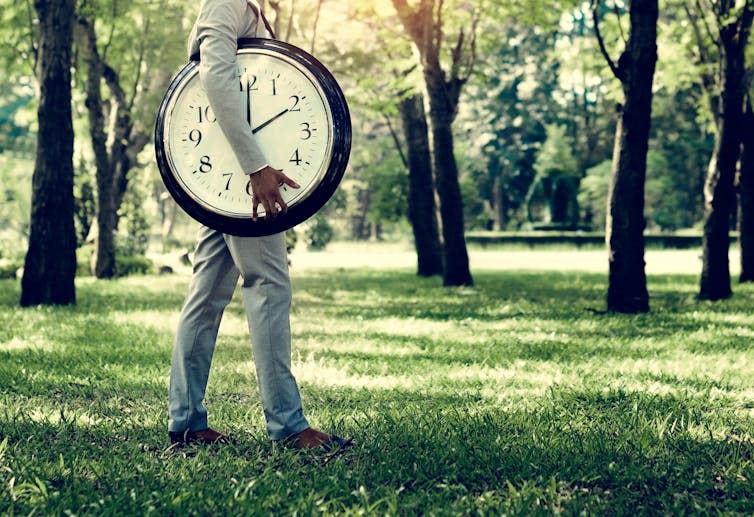Do you ever feel like there aren’t enough hours in the day? That time is getting away from you somehow, and it’s impossible to fit everything in. But then, you step out into the countryside and suddenly everything seems slower, more relaxed, because time has somehow changed.
It’s not just you – recent research has shown that nature can control our sense of time.
For many of us, the combined demands of work, home and family mean we always feel like we don’t have enough time. Time poverty is also exacerbated by digital technologies. Constant connectivity extends working hours and can be difficult to switch off from the demands of friends and family.
Recent research suggests that the antidote to our lack of time may lie in the natural world. Psychologist Richardo Correia, at the University of Turku in Finland, discovered that being in nature can change the way we experience time and, perhaps, we can even have an abundance of time.
Correia examined research that compared people’s experiences of time when they performed different types of tasks in urban and natural environments. These studies have consistently shown that people report increased time spent in nature compared to when they were in an urban environment.
For example, people are more likely to view a walk in the countryside as a longer walk than a walk of the same length in the city. Similarly, people report seeing time pass more slowly when performing tasks in green natural environments than in urban environments. Nature seems to be slowing down and expanding our perception of time.
It is not our sense of time in the present that seems to have been changed by the natural world, it is our sense of the past and the future as well. Previous research shows that spending time in nature helps shift our focus from the present moment towards our future needs. So instead of focusing on the stress of the demands on our time, nature helps us see the bigger picture.
This can help us prioritize our actions so that we achieve our long-term goals rather than living in a perpetual state of “having to keep our heads above water”.
This is in part because spending time in nature appears to make us less impulsive, allowing us to delay immediate gratification in favor of long-term rewards.
Why does nature affect our sense of time?
Spending time in nature is known to have many health and wellbeing benefits. Access to natural spaces such as beaches, parks and woodlands is associated with reduced anxiety and depression, improved sleep, reduced levels of obesity and cardiovascular disease, and improved well-being.

Some of these benefits may explain why nature changes our experience of time.
Our internal biological state and the events going on in the world around us shape how we experience time. As a result, emotions such as stress, anxiety and fear can distort our perception of the passage of time.
The calming effect of natural environments can combat stress and anxiety, resulting in a more stable experience of time. In fact, lack of access to nature during COVID-19 may help explain why people’s sense of time has become so distorted during the pandemic lockdowns.
In the short term, it may provide the relief needed to prioritize being away from the demands of today’s life, and reduce the time pressure by focusing on what really needs to be done. . In the long term, time in nature can help improve our memory and attention, making us better able to cope with the demands on our time.
Discover nature
Getting out into nature may seem like a simple solution, but for many people, especially those living in urban areas, nature is hard to come by. Green infrastructure such as trees, woodlands, parks and allotments in and around towns and cities is essential to ensure that the benefits of time in nature are accessible to all.
If you can’t spend time in nature, there are other ways you can regain control of your time. Start by taking a close look at how you use time during the week. Auditing your time can help you see where time is being wasted and identify action that will help you free up more time in your life.
Or, try setting some boundaries for yourself about how you use time. This could be limiting when you access email and social media, or it could be booking time in your calendar to take a break. If you take control of your time and how you use it, you can overcome the feeling that time is running out.
This article from The Conversation is republished under a Creative Commons license. Read the original article.


Ruth Ogden receives funding from the British Academy, The Wellcome Trust, the Economic and Social Research Council, CHANSE and Horizon 2020. This piece was written as part of the ESRC grant project “TIMED: TIME experience in Europe’s Digital Age” (ES/X005321 /1) supported by CHANSE and the British Academy project “The Times of a Just Transition” (GCPS2\100005).
Jessica Thompson is the Chief Executive Officer for City of Trees, a community forestry charity based in Manchester (UK) and is involved in academic research to better understand the impacts of civic environmental action through an academic lens.